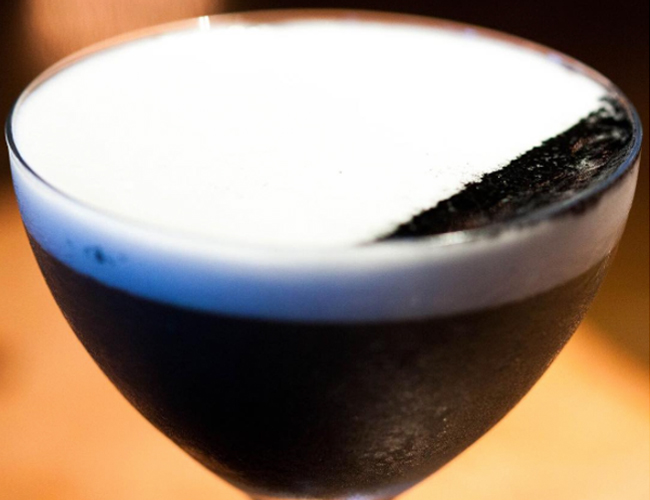Activated charcoal has quickly become a trendy ingredient for those looking for a potential detoxifying agent to add to food, drinks and beauty products. In a time when food and drink trends can be reliant on what looks most dramatic on Instagram, activated charcoal has become something of a darling.
For those in the know, though, it can also be somewhat controversial. Activated charcoal is made from coconut husks, peat, wood and other products and is specially treated for use related to health conditions. But because of it’s detoxifying effects, activated charcoal potentially can interact with medications, which is why some bartenders say it should be avoided.
Last summer and fall, Adam Nystrom, lead bartender at E.P. & L.P. in West Hollywood, was inspired to create a seasonal offering using activated charcoal. Some juice bars in town would add activated charcoal to their green juices and other highly nutritious offerings. Nystrom found that a little bit funny, given that, “…the detoxifying nature of it doesn’t just pull toxins, it just pulls everything,” Nystrom said. “So whether that be the things that you want to be taken out of your system or the things that you’re intentionally putting in, it can’t decipher, it just absorbs everything. And so the idea of putting it in a healthy drink was always so funny to me because you’re not going to properly absorb the nutrients that you’re attempting to put into your body at the same time.” Because it was seasonal, Nystrom’s drink, the Black Thai Optional, is no longer served there, but he recognized (and still does) the necessity to educate guests about the potential for medication interactions.
Charlee Weekes, the head bartender at MONEYGUN in Chicago, agrees that education is extremely important. The team at MONEYGUN included two cocktails that incorporated activated charcoal as part of a special collection released right before Black Friday last fall. Weekes treats activated charcoal like any raw ingredient that might need to be treated especially sensitively. “[I]f you’re going out to eat and you order a raw burger, somewhere on your menu it’s gonna say, like, ‘Consuming raw meats or fish may cause food borne illnesses.’ So I think that it’s important, if you’re going to put an odd ingredient or something that might have adverse effects on certain people, to just really make sure that you’re educating people and telling them and making it as clear as possible that, you know, ‘Hey, if you took birth control or a medicine in the last two hours and you drink this drink, it may cancel out the effects of the medicine you’re taking.’”
Nystrom noted that very little activated charcoal was used in the drink at E.P. & L.P. That wasn’t necessarily because of potential medication interactions or other health reasons, but rather because, according to Nystrom, the texture of the drink was compromised if any more was added. “[O]ne of the things that was difficult for us to hone in at the beginning was, even just a little bit too much of it in the drink and the texture would become overwhelming,” said Nystrom. “It was nice to get a little bit of that because then you’ve got a sort of intense minerality that was nice in the drink, but we’re talking about minuscule amounts over where you want to be and it’s overpowering. And so, we were using, I would estimate, like, 5 percent of what a normal dosage, like if you were to take an activated charcoal pill, we were using such a minuscule amount of even one of those pills in order to get the effect that we wanted in the cocktail.”
Education is key, in front of and behind the bar
While some bartenders argue that with research, education and the amount of charcoal that’s actually used in the drink, the risk isn’t all that great. Others contend that it’s more of a risk than they’d like to take.
“We have to be aware of what we’re providing. And no offense to our customers, as intelligent as they are, in a bar setting, they’re in the process of getting worse and worse at deciding. That’s how it goes,” said Jared Berry, beverage director at Farm League Design and Management Group in the Bay Area. “So to put the decision in their hands instead of our hands, I think, is a risk I’m not willing to take with my customers, absolutely.”
Many guests would likely be somewhat unaware of any potential risks posed by the ingredient unless there had been a reason for them to look into it more, which means, in Berry’s view, that it’s extra important for bartenders and other staff to do that research and share what they learn. “I just think that in no situation should we be putting anyone in harm’s way. And that can be avoided while using the product, but I mean, nobody reads the small print,” he said.
According to Nystrom, the education part isn’t difficult. “[I]t’s easy to make that part of the entire spiel and allure, like, ‘Hey this is a detoxifying ingredient, but it’s not really discriminating about what it detoxifies from your body, so if you happen to be taking anything, take that into account,’” he said.
It’s also worth noting that activated charcoal likely only interacts with drugs while everything is in your stomach. According to an article from Everyday Health, if you’re taking medications or other supplements, it’s best to ingest activated charcoal either one hour before or two hours after you take any medications.
Precautions, in the end, are clearly required when considering activated charcoal in a drink.
“I think there’s a lot of merits to come with new ingredients and new things, like we’re kind of seeing a resurgence of some of the gastro-mixology things and I think that’s great,” said Berry. “I really think presentation and technique should be pushed all the time, but with a zero margin for risk.”





